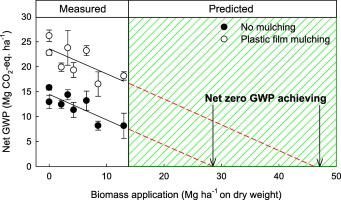Science of the Total Environment ( IF 8.2 ) Pub Date : 2021-10-16 , DOI: 10.1016/j.scitotenv.2021.151015 Jeong Gu Lee 1 , Ho Gyeong Chae 2 , Gil Won Kim 3 , Pil Joo Kim 1 , Song Rae Cho 4

|
Plastic film mulching (FM) became a general practice to enhance crop productivity and its net primary production (NPP), but it can increase greenhouse gas (GHG) emissions. The proper addition of organic amendments might effectively decrease the impact of FM on global warming. To evaluate the feasibility of biomass addition on decreasing this negative influence, cover crop biomass as a green manure was incorporated with different recycling levels (0–100% of aboveground biomass) under FM and no-mulching. The net global warming potential (GWP) which integrated with soil C stock change and GHG (N2O and CH4) fluxes with CO2-equivalent was evaluated during maize cultivation. Under the same biomass incorporation, FM significantly enhanced the grain productivity and NPP of maize by 22–61 and 18–58% over no-mulching, respectively. In contrast, FM also highly increased the respired C loss, which was 11–95% higher than NPP increase, over no-mulching. Irrespective with biomass recycling ratio and mulching system, negative NECB which indicates the decrease of soil C stock was observed, mainly due to big harvest removal. FM decreased more soil C stock by 57–158% over no-mulching, but its C stock was clearly increased with increasing biomass addition. FM significantly increased total N2O and CH4 fluxes by 4–61 and 140–600% over no-mulching, respectively. Soil C stock changes mainly decided net GWP scale, but N2O and CH4 fluxes negligibly influenced. As a result, FM highly increased net GWP over no-mulching, while this net GWP was clearly decreased with increasing biomass application. However, cover cropping, and its biomass recycling was not enough to compensate the negative impact of FM on global warming. Therefore, more biomass incorporation might be essential to compensate this negative effect of FM.
中文翻译:

覆盖作物及其生物量掺入:不足以弥补地膜覆盖对全球变暖的负面影响
地膜覆盖 (FM) 已成为提高作物生产力及其净初级生产 (NPP) 的普遍做法,但它会增加温室气体 (GHG) 排放。适当添加有机添加物可能会有效降低 FM 对全球变暖的影响。为了评估添加生物量减少这种负面影响的可行性,在 FM 和无覆盖下,将覆盖作物生物量作为绿肥与不同的回收水平(地上生物量的 0-100%)相结合。与土壤 C 库变化和 GHG(N 2 O 和 CH 4)通量与 CO 2整合的净全球变暖潜势(GWP)- 在玉米种植期间评估了等效值。在相同的生物量掺入下,与不覆盖相比,FM 分别显着提高了玉米的谷物生产力和 NPP 22-61% 和 18-58%。相比之下,与无覆盖相比,FM 还大大增加了呼吸 C 损失,比 NPP 增加高 11-95%。不考虑生物量回收率和覆盖系统,观察到负 NECB 表明土壤 C 库减少,主要是由于大收获去除。与无覆盖相比,FM 减少了更多的土壤碳储量 57-158%,但其碳储量随着生物量添加量的增加而明显增加。与无覆盖相比,FM 分别显着增加了总 N 2 O 和 CH 4通量 4-61% 和 140-600%。土壤 C 库变化主要决定净 GWP 规模,但 N2 O 和CH 4通量的影响可以忽略不计。因此,与无覆盖相比,FM 大大增加了净 GWP,而随着生物量应用的增加,该净 GWP 明显降低。然而,覆盖作物及其生物量回收不足以弥补FM对全球变暖的负面影响。因此,更多的生物量掺入对于补偿 FM 的这种负面影响可能是必不可少的。











































 京公网安备 11010802027423号
京公网安备 11010802027423号